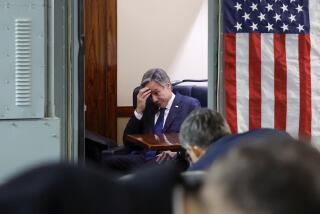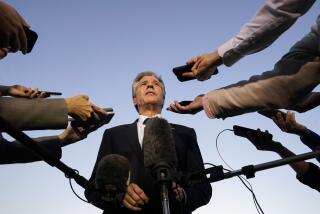U.S. debates how to respond to Arab world turmoil
- Share via
Reporting from Washington — With demonstrations intensifying across the Mideast, Obama administration officials are debating how quickly to push Arab allies toward reforms that could stabilize their governments — or usher in new leaders less friendly to the United States.
Administration officials hold differing views on how far these governments should go in granting concessions to demonstrators who may prefer regime change to gradual improvements, officials say.
The U.S. approach has been to stand by its allies and support “reform, but evolutionary reform,” said an official familiar with the internal debate. The question now is “do we favor changes that are quicker, but maybe a lot riskier?” said one official, who spoke on condition of anonymity due to the sensitivity of the matter.
The protests have become an increasingly urgent issue for Washington as public unrest has spread in recent weeks from Tunisia across the region.
Egypt is a prime example. The Obama administration is calling for the government of President Hosni Mubarak to give a greater voice to the political opposition. Demonstrators are planning more protests for Friday that they hope will include a large turnout by members of the banned Muslim Brotherhood, the largest opposition group.
Although the United States has been pushing Egypt for years toward political reform, U.S. officials worry that too much upheaval could threaten a strategic alliance that has been one America’s most important sources of influence on issues such as fighting terrorism, the Arab-Israeli peace talks and Iran.
On Thursday, demonstrators also turned out by the thousands in Yemen, an impoverished state that is a haven for Al Qaeda and other militants. The U.S. fears regime change in Yemen would risk a partnership that has been increasingly important in battling violent extremism in the region.
The administration, eager to show its support for the movement spreading across the region, Wednesday stepped up its call for the Egyptian government to accede to pressure for reform. Secretary of State Hillary Rodham Clinton said the protests provided “an important opportunity … to respond to the legitimate needs and interests of the Egyptian people.”
U.S. officials say that in the weeks ahead they intend to continue to cultivate Egyptian activist groups, even while working closely with the government to try to encourage reforms. Most of the contacts with the government in recent days have been through U.S. Ambassador Margaret Scobey.
But officials acknowledge that the administration is struggling to understand what is happening in the country.
One U.S. official, asked about the risk of regime change, acknowledged that American officials have had to catch up to events.
“We were surprised by what happened in Tunisia,” the official said. Tunisian President Zine el Abidine ben Ali fled his country Jan. 14 after weeks of protests by demonstrators angry over corruption, a poor economy and lack of opportunity.
President Obama praised Mubarak in a YouTube video presentation Friday.
Mubarak “has been very helpful on a range of rough issues in the Middle East. But I’ve always said to him that making sure they are moving forward on reform — political reform, economic reform — is absolutely critical to the long-term well-being of Egypt,” he said.
Vice President Joe Biden, in an appearance on PBS, also threw in a vote of support for Mubarak, saying: “I would not refer to him as a dictator.”
Skeptics have long warned that political liberalization could install Islamist governments that could quickly turn their backs on political freedom.
Robert Danin, a longtime former U.S. government specialist on the Mideast, said U.S. administrations “have been pushing for evolutionary change — and that’s what we should still be pushing for now. Rapid change leads to the unknown, and that unknown could be inimical to U.S. interests.”
Danin said the administration, in its public statements, is trying to achieve a careful balance between support for the objectives of the demonstrators and support for the existing government.
“That’s a really tough balance,” said Danin, now with the Council on Foreign Relations.
Many demonstrators “don’t want a modification of the current order — they want a complete break. That’s where their interests, and the U.S. government’s, differ. And that’s why the U.S. is in such a bind,” said Shadi Hamid, an analyst with the Brookings Institution in Doha, Qatar.
Hamid said that in Tunisia, Ben Ali sought to appease the protesters with promises of elections and political reforms. But the pledges were too little or too late.
The U.S. calls for reform have placed significant pressure on the Mubarak government, Hamid said. At the same time, Mubarak has long resisted giving ground to demonstrators, which could mean violence is ahead.
“He has a stubborn streak, which is why I think this could get messy,” he said.
More to Read
Get the L.A. Times Politics newsletter
Deeply reported insights into legislation, politics and policy from Sacramento, Washington and beyond. In your inbox twice per week.
You may occasionally receive promotional content from the Los Angeles Times.











